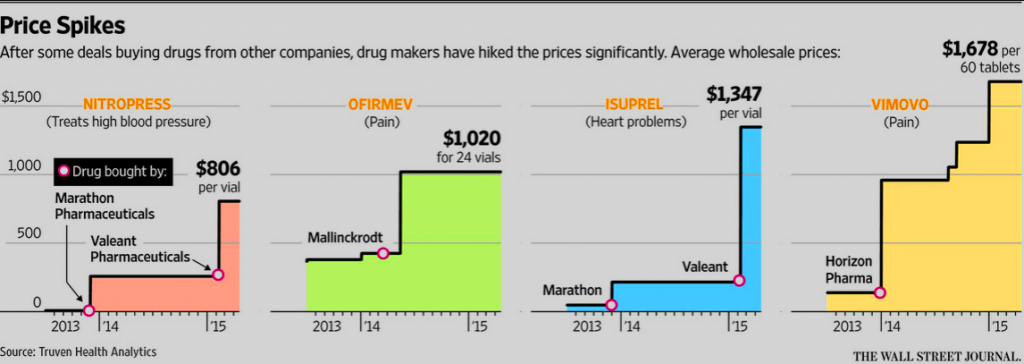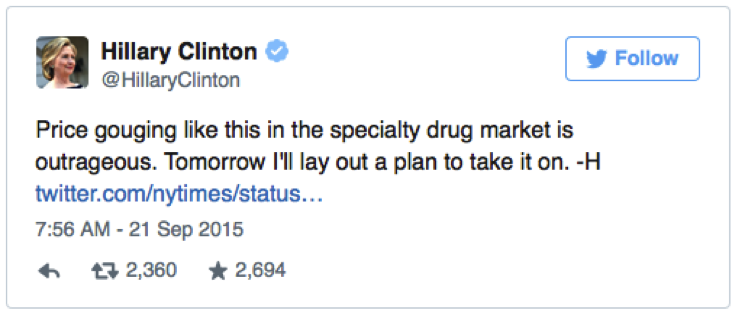Daraprim and Predatory Pricing: Martin Shkreli’s 5000% Hike
Turing Pharmaceuticals recently acquired the drug Daraprim and immediately raised the price over 5000%, from $13.50 to $750 a pill; the annual price for some patients rose as high as several hundred thousand dollars. Daraprim was developed in the 1950s to treat toxoplasmosis, a relatively common parasitic infection. Patients with weakened immune systems—such as those with HIV/AIDS—are at increased susceptibility and the drug is in fairly widespread distribution.
After the price hike, Turing’s CEO, former hedge-fund manager Martin Shkreli, became the most-hated man in America, widely panned for greed and predatory pricing. He also did himself no favors through social media, for example by posting inflammatory photos. While his Twitter account has now been made private, there are some gems still cached. For example: “How do I sleep at night? You know, Ambien.” Or: “it seems like the media immediately points a finger at me[;] I point one back at em [sic], but not the index or pinkie.” I doubt he means his ring finger or thumb. Amid the furor, Shkreli backtracked, saying he would lower the price, though with no indication as to what that new price would be.
While Daraprim has dominated the headlines, this pricing trend is not uncommon. Last year, Valeant Pharmaceuticals acquired Isuprel and Nitropress—both of which are used to treat heart-related ailments—from Marathon Pharmaceuticals. After the acquisition, Valeant raised the price of Isuprel 525% and the price of Nitropress 212%. Cycloserine—a drug used to treat drug-resistant tuberculosis—was hiked 2100% after its acquisition by Rodelis Therapeutics. Horizon Pharmaceuticals acquired pain-medication Vimovo, then raised the price 597%.
This chart from the Wall Street Journal makes visual some of these hikes:

Aside from pointing to the magnitude of the increases, though, why are they morally dubious? In a nutshell, from the Guardian: “Part of the problem is that there are individuals like Shkreli scouring the market for drugs like Daraprim that don’t have effective generic rivals (perhaps that market is too small for a generic drug maker to view it is profitable; perhaps, as in Daraprim’s case, there are unique issues surrounding the requirements for regulatory testing) or other factors that give the drug a lot of effective pricing power. The profit-minded individual or company snaps up the patents, suddenly hikes the drug’s price and puts consumers—from insurance companies to individuals—in a position of either paying what is demanded or going without” (h/t Daily Nous).
In other words, the issue is not simply that drug companies charge dearly for their drugs, or necessarily even that those companies raise the price of drugs after acquiring them. Rather, the issue is that these drug companies begin by querying which drugs can sustain large pricing increases; this is the impetus behind the acquisitions in the first place. This is a nefarious motivation, and therein lies the moral fault.
The point here is not to hate on capitalism, or to think that drug companies are not entitled to profits. Rather, as philosopher Thomas Pogge has argued, pharmaceuticals should not be conceived of as normal market goods for a wide range of reasons (h/t Adam Henschke). For example, they are different from tennis balls insofar as the former are necessary for health and well-being in ways that others are not. Pharmaceuticals can also be conceived of as “primary goods”—to borrow a term from John Rawls—under which they subserve nearly any conception of the good: whatever it is that people want, they are almost always more likely to satisfy those preferences while healthy.[1] Most obviously, though, jacking around with drug prices can adversely affect vulnerable populations in a host of ways, not just their pocketbooks but, maybe even their health or lives. The stakes are not only high, they’re maybe even incommensurable with others.
It is easy here to notice that drugs are sometimes acquired and then subjected to several magnitudes of price increase. What is less easy to say, though, is how much tolerance we should have for price variance. To put it another way, what if Daraprim’s price had gone up, not 5000%, but 50%, or 500%? Where’s the line? A recent forum by bioethicists conceded that there was no worked out theory as to what constitutes fair drug pricing; per above, the worry is more about motivations than the actual numbers.
When interviewed, drug executives certainly say a lot of the right things. Scott Spencer, who runs the company that acquired and raised the price on Cycloserine, talked about the increased revenues being used to improve the drug and to reduce side effects. Shkreli, perhaps noting the plausibility of this line, echoed it. Spencer also said that Cycloserine was given away for free to those who could not afford it, a line also adopted by Shkreli. There is also the standard chestnut that, without profits, drug companies would not be properly encouraged to develop new and needed drugs. Drug development is not free, many prospective drugs are never brought to market, the FDA takes forever to approve them, and so on. In order to get the entire pharmaceutical industry off the ground, there have to be profits somewhere. Right? Right?
Sure. But nobody thinks that pharmaceutical companies shouldn’t profit at all. The question is just where the boundary lies between the right incentive structure and predatory pricing foisted upon vulnerable populations. Maybe $13.50 is too low for Daraprim, but it hardly follows that $750 makes sense, either.
Another important axis to note here is the political one. Perhaps not coincidentally, the furor over Daraprim was catalyzed by a Tweet sent out by Candidate Clinton before one of her stump speeches:

Bernie Sanders was on top of this way back in 2013, before he had even declared himself a presidential aspirant. But because of the election cycle, a story that might have otherwise languished on the vine is now in plain view. It is far clearer what the Democrats are going to say, though, than the Republicans. For the former, “regulation” is not a four-letter word. (For those counting at home, it actually doesn’t have four letters, so the Democrats might be onto something.)
But even Republican candidate Donald Trump has gone after Shkreli. In typical bombastic fashion, Trump’s lambast: “That guy is nothing. He’s zero. He’s nothing. He ought to be ashamed of himself.” From this side of the political aisle, though, what’s the solution? Free markets are sacrosanct, and Shkreli is nothing if not a free market ideologue. I actually wonder what the more cerebral Republicans might propose here—and yes, contra my friends from the left, there actually are some.
While Shkreli has been pilloried, an important takeaway is that his re-pricing of an acquired drug is not isolated; if anything, it is endemic of a broader industry practice. In some sense, the takeaway isn’t even that Shkreli has become a pariah, it’s that he’s won: he stands to significantly increase the profits of his company. We need a broader conversation about what norms are appropriate for this industry, and what the mechanisms for enforcements of those norms are meant to be.
[1] There’s always the philsopher’s trick of wondering about the person who prefers to be unhealthy: is this person necessarily irrational? Or what about the Christian Scientist whose conception of the good may well be incompatible with assistance from modern medicine? Worthy questions, but I shall not pursue them further here.
Fritz Allhoff, J.D., Ph.D., is a fellow at the Center for Law and the Biosciences.
Faculty
Clients & Deliverables
1 Response to “Daraprim and Predatory Pricing: Martin Shkreli’s 5000% Hike”
Comments are closed.
Post Pagination

Sue
This article skirts around the ‘real issue’. That is the issue of the highly questionable and strange FDA policies of not encouraging free competition by approving other similar drugs. The pharmaceutical price gouging in the US is made possible by the FDA who do the biddings of the interest groups. The fact that Daraphim has been the only approved official drug in this area states the suspicion loud and clear. And yet, people and the media are busy just going after one man whose unabashed greed led him to exploit the obvious loopholes created at the courtesy of the FDA. It’s like trying to catch the sneeze without looking at the cause.